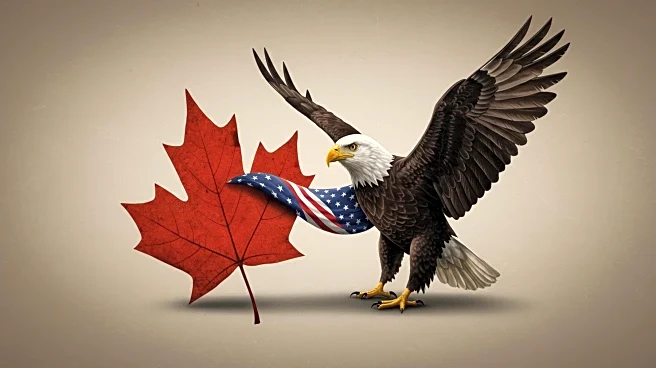What is the story about?
What's Happening?
Canada, under Prime Minister Mark Carney, has announced the removal of tariffs on billions of dollars worth of American products. This policy shift is seen as an effort to ease trade tensions with the Trump administration. The tariffs, which were initially imposed in retaliation to President Trump's protectionist measures, affected a wide range of US consumer goods, including orange juice, wine, clothing, and motorcycles. The rollback applies to approximately $21.7 billion worth of US goods. However, Canada will maintain its tariffs on US steel, aluminum, and automobiles, sectors where the US has imposed its own levies. This decision follows a phone conversation between Carney and President Trump, marking a significant change from Carney's previous aggressive stance during his election campaign.
Why It's Important?
The removal of tariffs by Canada is significant as it represents a shift in trade relations between the two countries, potentially reducing tensions that have affected various industries. The rollback could benefit US manufacturers and exporters by making their products more competitive in the Canadian market. It also signals a possible thaw in the trade war that has seen both countries impose tariffs on each other's goods, impacting industries such as automotive and metals. For Canada, this move may help in positioning itself favorably for the upcoming review of the US-Mexico-Canada Agreement (USMCA), which governs trade relations in North America. The decision could also influence other countries' trade policies with the US, as they observe the outcomes of Canada's approach.
What's Next?
The next steps involve continued discussions between Canada and the US on trade and national security concerns. The upcoming review of the USMCA will be a critical juncture for both countries to address any remaining trade issues. Stakeholders in affected industries, such as automotive and metals, will be closely monitoring these developments. Additionally, the response from the Trump administration and its impact on future trade policies will be pivotal. Businesses and policymakers will need to assess the long-term implications of this tariff rollback on their operations and strategies.
Beyond the Headlines
This development highlights the complexities of international trade relations and the balancing act countries must perform between protecting domestic industries and maintaining favorable trade partnerships. The decision by Canada to lift tariffs, while maintaining some, reflects a strategic approach to safeguard its economic interests while reducing potential trade barriers. It also underscores the influence of political leadership changes on trade policies, as seen with Prime Minister Carney's shift from a combative to a more conciliatory stance.















